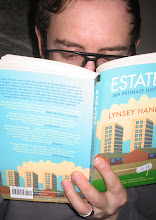Books and topics I'd like to read about this year:
- more on cycling. I'm increasingly a cycling fan / nerd / fanatic / wierdo (delete as you feel appropriate) and as you might expect have a similar penchant for cycling literature. Previous great cycling reads include Matt Seaton's extremely touching The Escape Artist, and the intially strange but soon enchanting One More Kilometre and We're in the Showers by Tim Hilton. On holiday over Xmas I found a copy of Will Fotheringham's biography of almost-mythic British cyclist Tom Simpson (whose dying words, at the summit of Mont Ventoux on the Tour de France in 1967 were 'put me back on my bike' and then 'the straps, Harry, the straps') and that will be devoured soon enough. I'm also mid way through a other-worldly, spellbinding short and highly illustrated work of modern British cycling literature (or, perhaps, pornography), the Condor Cycles 60 year catalogue...I'm thinking of investing, you see...
- crime. Getting older is all about discarding prejudices, from anal sex to genre fiction, and in that spirit I'm keen to feel my way through some classics of crime writing - Dashiel Hammet, Raymond Chandler, Patricia Highsmith, um...I need some more help though...
- Robert Macfarlane's The Wild Places - a Xmas present from my wife. Can't wait for that.
- WG Sebald's newly-discovered posthumous masterwork...which doesn't yet exist, sadly. I'm a big fan of Sebald's meandering, multi-disciplinary hallucinogenic uber-prose and have read a few of his books, especially The Rings of Saturn, quite a few times. It makes me sound very learned and discerning, but I think the translations of his books published by Harvill is better than Anthea Bell's for Austerlitz, his first published by Penguin...but I don't know what I'm basing that on... The bits and pieces published by Penguin since his death have been a bit disappointing - On the Natural History of Destruction, his exculpation of the guilt-ridden lack of German moral reaction towards the British for the mass fire-bombing of WW2 exemplified in Dresden, was excellent - but is only a part of that book. Actually, Campo Santo I haven't read yet but will do.
So much to read, so little time. I suppose I could stop this blog and read instead...hmm...
The best recent crime and thrillers – roundup
12 hours ago




